Tutor Doctor is a global tutoring franchise that offers personalized 1-on-1 tutoring both in home and online. It was founded in 2000 by John Hooi and now has over 600 franchise locations in more than 5 continents. The company emphasizes a unique matching process: an education consultant meets each student and family to assess needs, then matches the student with an expert tutor. In this article, we review what real customers say about Tutor Doctor in 2025, explain the pricing model, compare alternatives, and outline how the service works. We also share company facts, its strengths and weaknesses, and why platforms like My Engineering Buddy may be a smart alternative for some students.
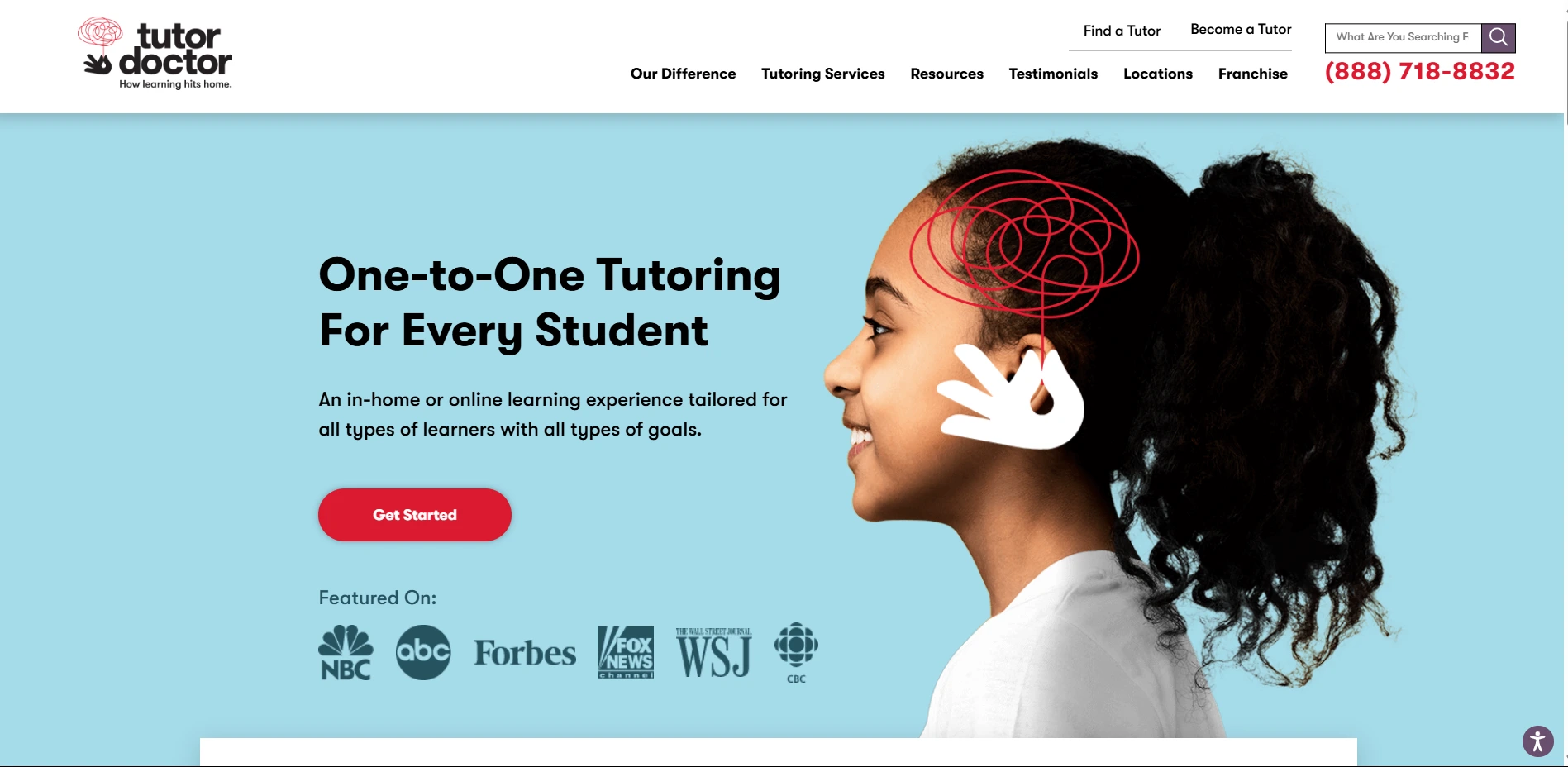
Tutor Doctor Reviews and Testimonials
Customer feedback on Tutor Doctor is mixed. On one hand, many of its local franchise websites showcase glowing testimonials and high ratings. For example, one branch boasts a 4.9 out of 5 rating on Google Reviews and shares quotes like: “Our daughter went into her first test of the semester feeling quite confident… she scored a 92% on her test!”:. Tutor Doctor’s own “Testimonials” page highlights similar success stories (e.g. parents praising improved grades and personalized tutoring). The company also claims a high satisfaction rate (95% of customers would recommend them) and a “tutor match” guarantee to ensure a good fit.
On the other hand, third-party reviews show many complaints. Consumer review sites like PissedConsumer rate Tutor Doctor very poorly (about 1.3/5 stars) with comments that many users feel “misled” or “ripped off” by billing and refund practices. A ConsumerAffairs summary similarly finds frustration over high costs and service issues.
Google searches and forums reveal recurring themes of aggressive sales tactics, confusing contracts, and billing problems For instance, one family reported prepaying $2,030 for 36 hours of tutoring and later being told the local branch closed, leaving them owed $1,182 without a clear refund. Many reviewers say Tutor Doctor requires large prepaid packages and then makes refunds difficult. In fact, the BBB notes Tutor Doctor has a B– rating and is not BBB-accredited, partly due to an unresolved complaint.
Is Tutor Doctor legit? Yes, Tutor Doctor is a legitimate company with a long track record and global franchise presence. It’s not a scam – however, customers should be aware of its business model. Reviews suggest the model centers on selling bundled hours and sometimes places more emphasis on contracts than on immediate results. Some families love the personalized attention, but others feel the costs are very high for what they received. In short, Tutor Doctor is a real, established tutoring service, but be sure to read the fine print and talk through policies before enrolling.
Tutor Doctor Pricing
Pricing Range
Tutor Doctor’s hourly rates vary by location but are generally in the range of $40–$80 per hour. For example, one report notes families paying $50–$70 per hour for high school math and science tutors. Competitive industry reports suggest packages often come out to about that level. Note that these prices are for one-on-one sessions; group tutoring (if offered) would be different. Prices can also depend on tutor experience and subject (SAT/ACT prep or advanced college subjects may be higher).
What Students Say About Pricing
Many students and tutors online note that Tutor Doctor can be expensive. On Reddit, for instance, one tutor from Toronto said they were paid only $18/hr while families were charged $50–$70/hr. In public forums, students often compare costs by saying Tutor Doctor tends to charge a premium. Discussion threads on sites like Reddit and Quora mention that parents should shop around because Tutor Doctor’s packages can be pricier than market average. Some former tutors recommend looking into alternatives if budget is tight.
Hidden Costs
Families should watch for extra fees. Tutor Doctor may charge a non-refundable registration or enrollment fee upfront when you sign up. In one review, a family paid $2,030 for a 36-hour package plus a registration fee. Tutors have also reported having to pay for background checks or software subscriptions themselves. While not all offices share details online, it’s wise to ask upfront about any additional fees (e.g. technology or travel fees) before agreeing to a package.
How Pricing Works
- Prepaid Packages: Tutor Doctor typically requires families to prepay for a block of hours. For example, one reviewer described buying a 36-hour tutoring package at $2030, then later adding 25 more hours at $55/hour. The hours are used as needed; as you use them the balance goes down.
- Flexible Scheduling: Once purchased, you schedule sessions (weekly or biweekly) with your matched tutor. The cost per hour is fixed by the package, and you can use sessions over time (often there is a time limit on when hours must be used, so check your contract).
- Payment Options: Packages are paid in one lump sum (sometimes via credit or bank). There may be discounts for buying larger packages, but there is often no monthly installment plan unless arranged locally.
- Discounts: Some franchises may offer promotions like “buy 20 hours, get 4 free” or first-time discounts, but these vary by location. Always ask about coupons or family discounts when signing up.
Free Trial
Tutor Doctor usually does not offer a free tutoring session, but it does provide a free or complimentary consultation. According to their site, you can schedule a free consultation with an Education Consultant who will assess your child’s needs. This initial meeting is designed to understand the student’s challenges and recommend a plan. After the consultation, you’re under no obligation to continue; the paid tutoring begins only when you purchase hours.
Refund Policy
Be cautious with refunds. The company’s official policy (in the Terms of Use) says no refunds of prepaid fees if you cancel. However, the public “Guarantee” page claims a 60-day Money Back Guarantee on unused hours for families who aren’t satisfied. This means that, at least in writing, if you use only some of your hours within 60 days and want out, you *may* get the rest refunded. (In practice, customer reports suggest obtaining refunds can be difficult.)
According to many customer reviews, getting a promised refund can be very slow or contested. If you decide to cancel, contact your local Tutor Doctor office immediately and ask for a written refund policy or demonstration of their guarantee. Document any promises in writing.
Tutor Doctor Alternatives
Given the mixed reviews and costs, many families explore alternatives to Tutor Doctor. Here are some popular options:
Wyzant
What it is: Wyzant is an online tutoring marketplace where thousands of independent tutors list their services. Families choose tutors by subject, hourly rate, and reviews.
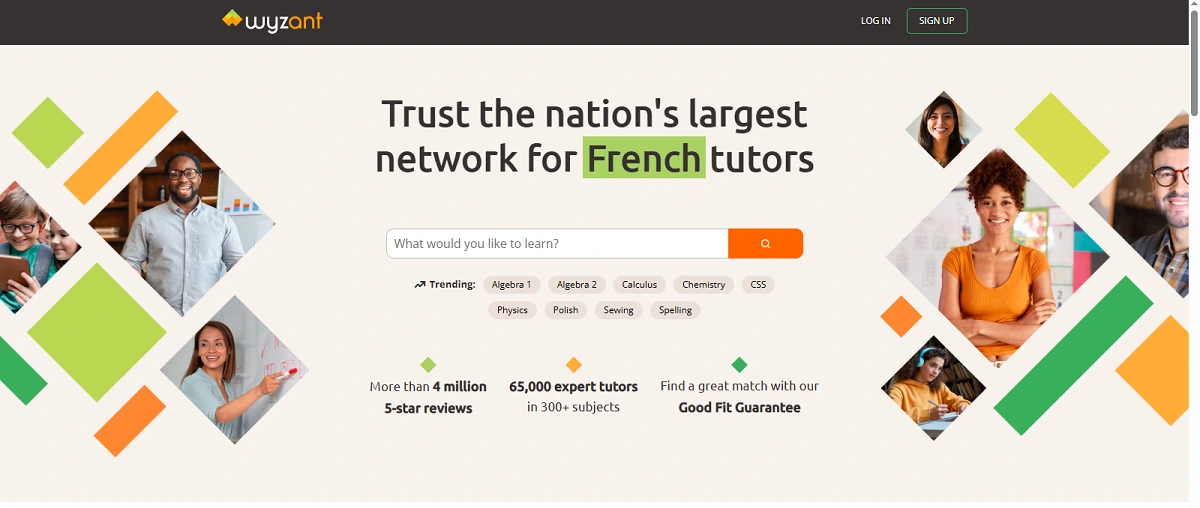
Why consider it: You pay per session (no large prepaid packages). You see tutor profiles with rates and ratings before booking. Tutors often work online via Wyzant’s platform or other tools.
Notes: Tutors set their own rates. Wyzant takes a 25% commission of the tutor’s pay, which can make rates seem high. Still, many students find lower hourly costs or short-term help. Reviews say Wyzant is good for finding a tutor on demand, but tech issues (video whiteboard) can occur.
Chegg (Tutors)
What it was: Chegg used to offer Chegg Tutors, a 24/7 help service where students could connect to tutors instantly. (As of 2021, the live tutoring service was discontinued.)
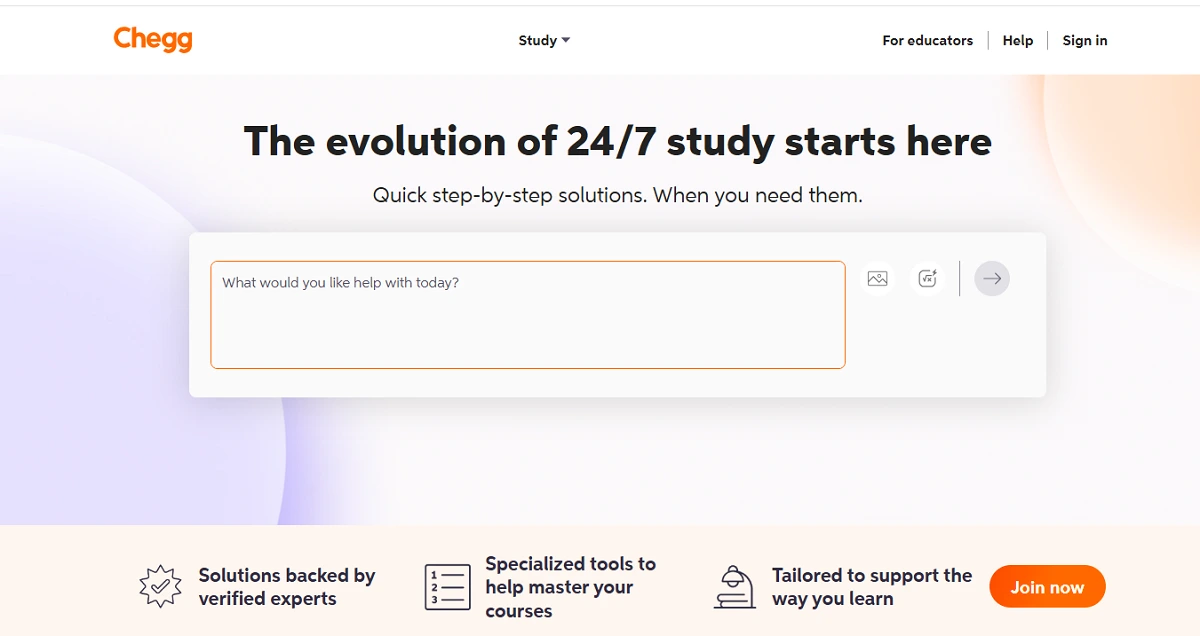
Why mention it: Chegg is a well-known education brand. Now, Chegg provides homework help through a subscription (Chegg Study) where students ask questions and get answers from experts (often at lower cost than live tutoring).
Notes: Chegg’s on-demand model (like Q&A or tutors-in-chat) was affordable but is no longer active. Families looking for Chegg-style help should know that only a static Q&A service remains. It’s useful for homework questions and study resources, but not a replacement for live tutoring sessions.
My Engineering Buddy
What it is: My Engineering Buddy is an engineering-focused tutoring platform (the site behind this article). It offers 1-on-1 help in math, science and engineering subjects online.
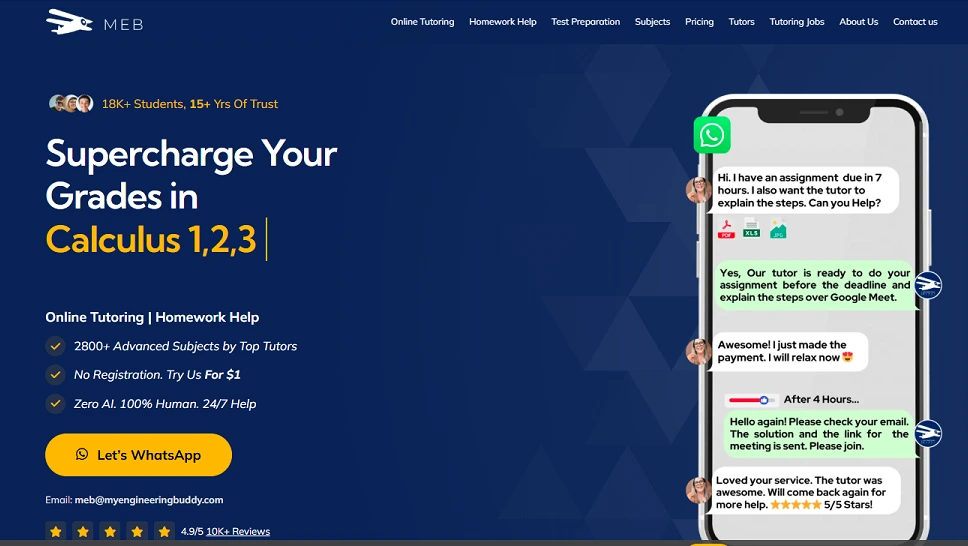
Why consider it: Unlike broad franchises, My Engineering Buddy specializes in STEM and engineering courses. It provides flexible scheduling, transparent hourly pricing, and tutors with specific expertise. Because it’s online-first, it can be more cost-effective (no in-home travel fees) and convenient for remote learners. User reviews highlight its tailored support and modern interface.
Notes: As a newer platform, My Engineering Buddy does not have physical locations, but it covers college-level subjects comprehensively. For example, it focuses on engineering courses like calculus, statics, circuit analysis, and helps with design projects.
Course Hero
What it is: Course Hero is an online learning platform that offers a mix of study resources and tutoring. Students subscribe to access textbook solutions, flashcards, and on-demand “tutoring” (often as Q&A or instant help).
Why consider it: Course Hero can be less expensive for some needs, because it offers a monthly subscription. Students can ask homework questions and get answers from tutors or search a large library of solved problems. It is popular for quick homework support.
Notes: Tutors on Course Hero report mixed experiences with pay and management. A Reddit tutor user said “I can confirm they’re legit… tutors get paid low” and some call out the management issues. Course Hero’s model is more like getting fast answers than a structured lesson plan, and its subscription adds up if you need a long-term tutor.
Skooli
What it is: Skooli (by BookRags) is an online tutoring marketplace mainly for math, science, and reading. It offers instant “pay-as-you-go” tutoring by the minute, as well as scheduled sessions.
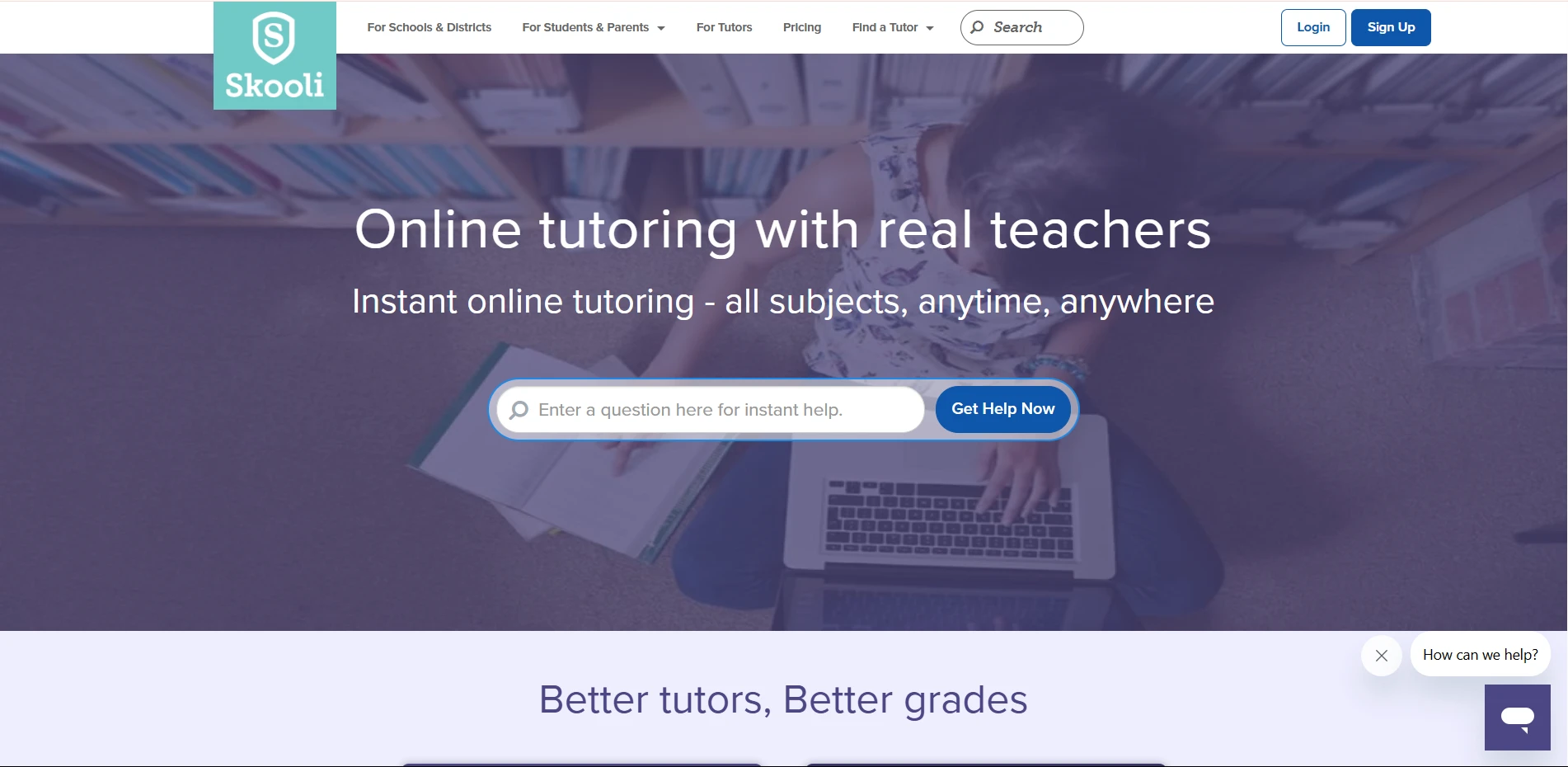
Why consider it: Skooli might be good for shorter help or help at odd hours. You can connect to a certified tutor or teacher online without a long contract. It’s used often for homework questions and test prep.
Notes: Pricing is generally per-minute (often around $1/min, so $60/hr equivalent), which can add up. It’s good for quick help or extra problem-solving, but may be less personal because tutors may not see your full school history. Also, availability of specialized topics can vary.
Why alternatives exist: Each of these alternatives addresses some of the pain points mentioned by Tutor Doctor customers. For example, Wyzant and My Engineering Buddy offer more flexible pay-as-you-go options. Course Hero and Skooli serve students who want on-demand homework help. When choosing, consider what you value: cost, subject specificity, online vs. in-person, and whether you want a guaranteed tutor match or just immediate answers.
How it Works?
For Students
The Tutor Doctor process starts with a conversation. Families either call or fill out an online form to request help. A tutor coordinator or Education Consultant then arranges a free consultation, usually at home or online. During this consultation, they discuss the student’s challenges and goals and may even meet the student in person. Based on this meeting, the service creates a personalized learning plan and matches the student with a tutor who fits their learning style.
Once matched, students schedule sessions directly with their tutor. Sessions can be held in the student’s home or online via Tutor Doctor’s platform (or a video tool). The tutor handles homework help, exam prep, or subject tutoring as planned. The scheduling is flexible: tutors set their availability and families pick times. The FAQ says the consultant “will discuss scheduling constraints and work with the family to determine the best schedule”. After each lesson, tutors typically provide progress reports to the family.
If the match isn’t working out, Tutor Doctor promises to reassign a new tutor under its Tutor Match Guarantee. Customers should always communicate with their local office or consultant about changes in scheduling, subject needs, or concerns. Support is provided through the local franchise; contact details are given at sign-up.
For Tutors
To become a tutor, one applies through the Tutor Doctor website, usually by entering your postal code to find a local franchise. Each franchise owner hires tutors in that area. Applicants typically need strong subject knowledge (often with a degree or teaching credential) and good communication skills. Once hired, tutors work as independent contractors (1099) and set their own schedules. Tutor Doctor advertises that tutors are “in the driver’s seat” – you can choose how much to work and focus on areas you like.
Online reviews from tutors suggest the work is flexible but part-time. For example, one tutor wrote that they had to pay for their own background check and found the hourly pay ($18/hr) much lower than what families were charge. Other tutors’ reviews say the training is minimal and you must supply your own materials. On the positive side, tutors say the job can be “rewarding” and they appreciate being matched to students rather than finding their own clients. Workload depends on demand in your area. Many tutors start at Tutor Doctor to gain experience and hours, then move on to private tutoring for higher pay once they build a reputation.
Salary-wise, tutors keep a percentage of what the family pays. Reports indicate tutors often earn 20-50% of the session fee (estimates around $18–$25 per hour, while clients pay double or triple that). Franchises set tutor rates by experience and subjects. Payment is usually weekly or monthly from your local franchise. Tutors have noted on Glassdoor that hours are not guaranteed and income can fluctuate with the school year.
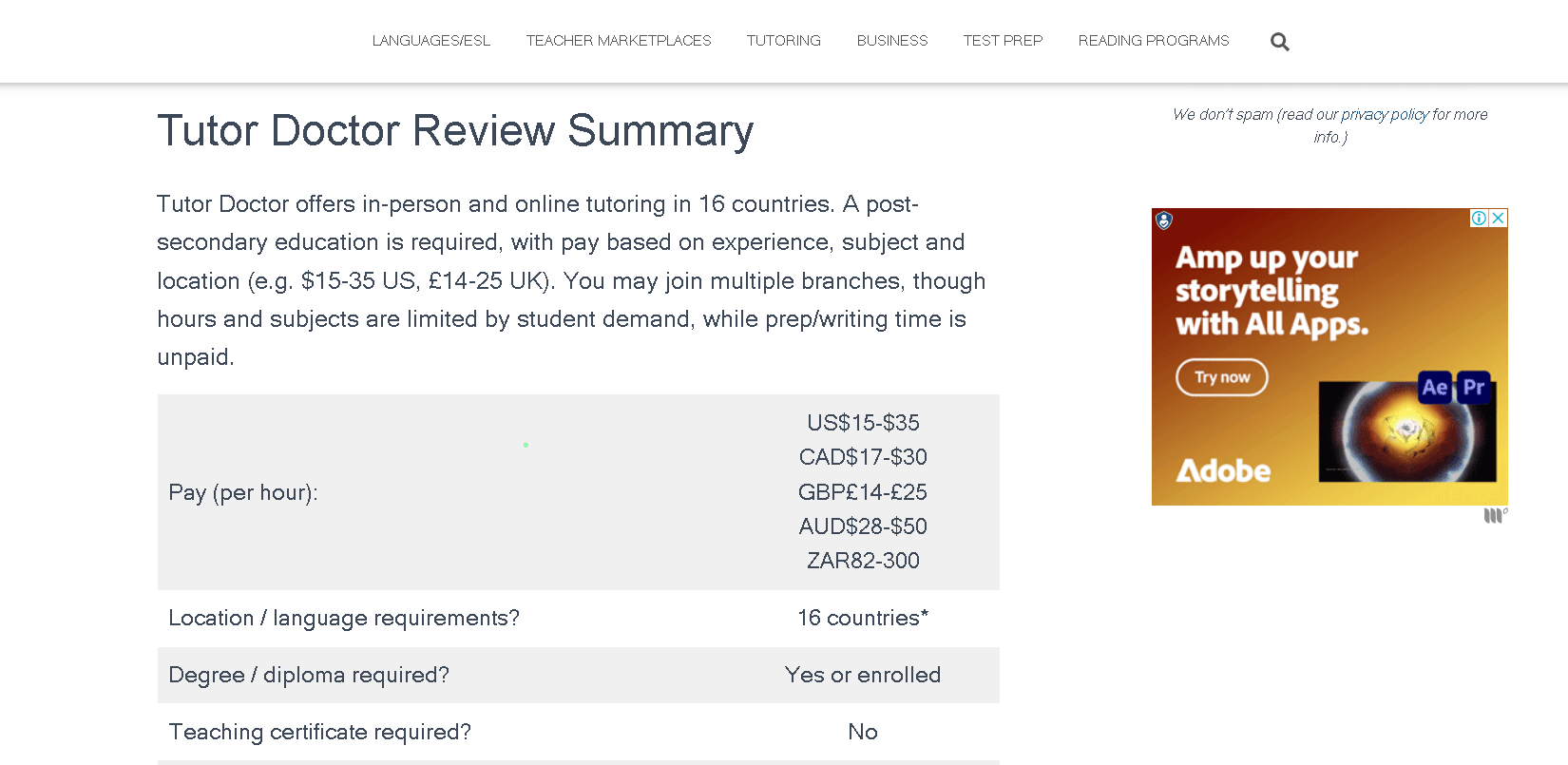
Tutor Doctor Company Information
Founding & Mission: Tutor Doctor began in 2000 as a small business in Canada. The founder, John Hooi, wanted to offer personalized learning instead of one-size-fits-all classroom teaching. The company’s stated mission is “to change the trajectory of students’ lives” through education. It emphasizes individual attention and tailored plans for each student. Today, Tutor Doctor has grown into a major franchise network, but it still highlights its personal approach as part of the mission.
Headquarters & Operations: The corporate headquarters is in Toronto, Canada, but Tutor Doctor operates globally. As of 2024, it has hundreds of territories in 16+ countries (over 600 offices on 5 continents). It was ranked the #1 in-home tutoring franchise by Entrepreneur magazine and has been on the Franchise 500 list for many years. The brand’s vision is now “positively impacting students and their families worldwide”.
Services & Subjects: Tutor Doctor offers one-on-one tutoring for all ages, from elementary through college and adult learners. Common subjects include Math, English, Science, SAT/ACT test prep, and foreign languages. They also provide specialized services like special education tutoring and summer programs. The tutoring is described as fully customized: in each area they meet with the family to set goals and create a unique tutoring plan. Most sessions are in-home, but online tutoring is also available, using a digital classroom when needed. According to Tutor Doctor, its network includes tens of thousands of tutors worldwide.
Unique Selling Proposition (USP)
Tutor Doctor’s USP is its personalized local service. Unlike online-only platforms, Tutor Doctor has a local consultant who guides each student through the entire process. They conduct a detailed initial consultation, then use a matching system to pair the student with a well-suited tutor. They also promise a “100% satisfaction” approach: guarantees on tutor matching and (formally) unused hours refund. Another key difference is the blend of in-home tutoring with the safety and convenience of a known brand. Marketing highlights include strict tutor screening, customized lesson plans, and ongoing monitoring of progress. Their motto is “Making Learning Personal,” and they emphasize values like passion and integrity.
Drawbacks of Tutor Doctor
- High Cost: Tutor Doctor is generally more expensive than many competitors. Customers often cite the high hourly rates and upfront package costs as a downside.
- Mandatory Packages: Many families complain they must buy large blocks of hours (e.g. 20–30+ sessions) instead of paying per lesson. This lack of flexibility can be problematic if needs change.
- Contractual Terms: Some reviews mention being locked into contracts, hidden fees, and difficulty cancelling or getting refunds. Despite the “money-back guarantee,” actual experience may vary by franchise.
- Variable Quality: Because each location is independently owned, tutor quality and management can differ widely. Some franchisees are very attentive; others have poor communication. Consumers have reported ignored calls/emails and spotty follow-up.
- Focus on Sales: Several parents have felt the sales rep’s job was to sell packages rather than address immediate learning problems. This aggressive sales image (noted in some reviews) can be a red flag for skeptical customers.
Comparison with My Engineering Buddy
My Engineering Buddy (MEB) is mentioned here as a strong alternative. Unlike Tutor Doctor’s broad franchise model, MEB focuses specifically on STEM and engineering tutoring online. Some key differences:
- Specialization: MEB covers college-level math, physics, and engineering subjects in depth, with tutors from relevant fields. Tutor Doctor tutors a wider age range but may not have deep subject specialists for higher-level topics.
- Delivery Mode: MEB is 100% online, which often lowers costs (no travel time) and allows global tutor selection. Tutor Doctor offers in-home and local online sessions through local offices.
- Pricing Model: MEB typically charges per session or short-term package without forcing large hour commitments. Tutor Doctor requires buying big packages up front, which can strain tight budgets. (MEB’s model tends to be more flexible.)
- Support & Flexibility: With MEB, students often book sessions via a website or app on-demand. Tutor Doctor assigns a dedicated consultant and has a set matching system. Some students prefer MEB’s on-the-fly scheduling, while others like the hand-holding of Tutor Doctor.
- Guarantees: Both offer guarantees: Tutor Doctor touts a match and money-back guarantee. MEB may offer its own satisfaction policies (which should be checked on their site). The spirit is similar: ensure student success, or remedy the situation.
In summary, if you need broad K–12 help and value a personal local approach, Tutor Doctor might appeal. But if you specifically need engineering/math tutoring with transparent pricing and online convenience, My Engineering Buddy could be a better fit.
Customer Support and Policies
Support is handled locally. Each Tutor Doctor franchise has its own office and number. During sign-up, you get the contact info for your local coordinator. Policies (like refunds, cancellations, or scheduling) often vary by location. In general, Tutor Doctor’s parent company provides a system of guarantees (tutor match and 60-day refunds). However, fine-print in the Terms of Use (for the website system) states no refunds upon termination. This contradiction means families should clarify with their branch what refunds they offer in writing. You should also ask about how cancellations work (e.g., how much notice is needed to reschedule or cancel a session) and whether any fees apply.
Customers have noted mixed experiences with support. Some branches get high praise for being responsive, while others are criticized for poor communication. For example, a PissedConsumer summary listed “Ignoring phone calls and emails” as a common complaint. Therefore, choose a location carefully – local franchise reputation can matter as much as the brand itself. On the positive side, the company emphasizes values like compassion, integrity, and teamwork, so many franchises strive to provide respectful, quality service.
Global Reach and Localization
Tutor Doctor’s global footprint is large. It operates in 16+ countries around the world. In practice, this means they have local offices in places like the US, Canada, UK, Australia, UAE, South Africa, etc. Each franchise tailors its services to local needs: curriculum standards, language, and cultural expectations. The company notes that tutors are available in various languages depending on the region, and offices adapt content (for example, aligning with local school curricula or exam prep standards). Local franchise websites often advertise their own highlights, demonstrating how Tutor Doctor’s global brand tries to stay relevant to each community.
Tutor Doctor’s Future Plans
Tutor Doctor continues to position itself as an innovator in tutoring. A 2024 franchise conference emphasized “embracing future opportunities” and using cutting-edge educational technology. The company’s blog indicates a clear interest in AI tools. For example, Tutor Doctor’s Australian site says they are already integrating GPT (ChatGPT) AI technology into their software to personalize lesson plans and speed up session reports. The UK blog encourages tutors to use ChatGPT to tailor learning and affirms that such tools “help ensure every student is treated as an individual”.
In essence, Tutor Doctor’s public strategy involves blending human tutors with new technology, not replacing tutors but helping them. They also continue to expand their franchise network globally (seeking new franchisees in 2024) and build partnerships (for example, with cognitive assessment companies). Overall, the plan is to stay at the forefront of personalized learning, combining traditional tutoring with innovations like AI-driven learning assessments and lesson support.
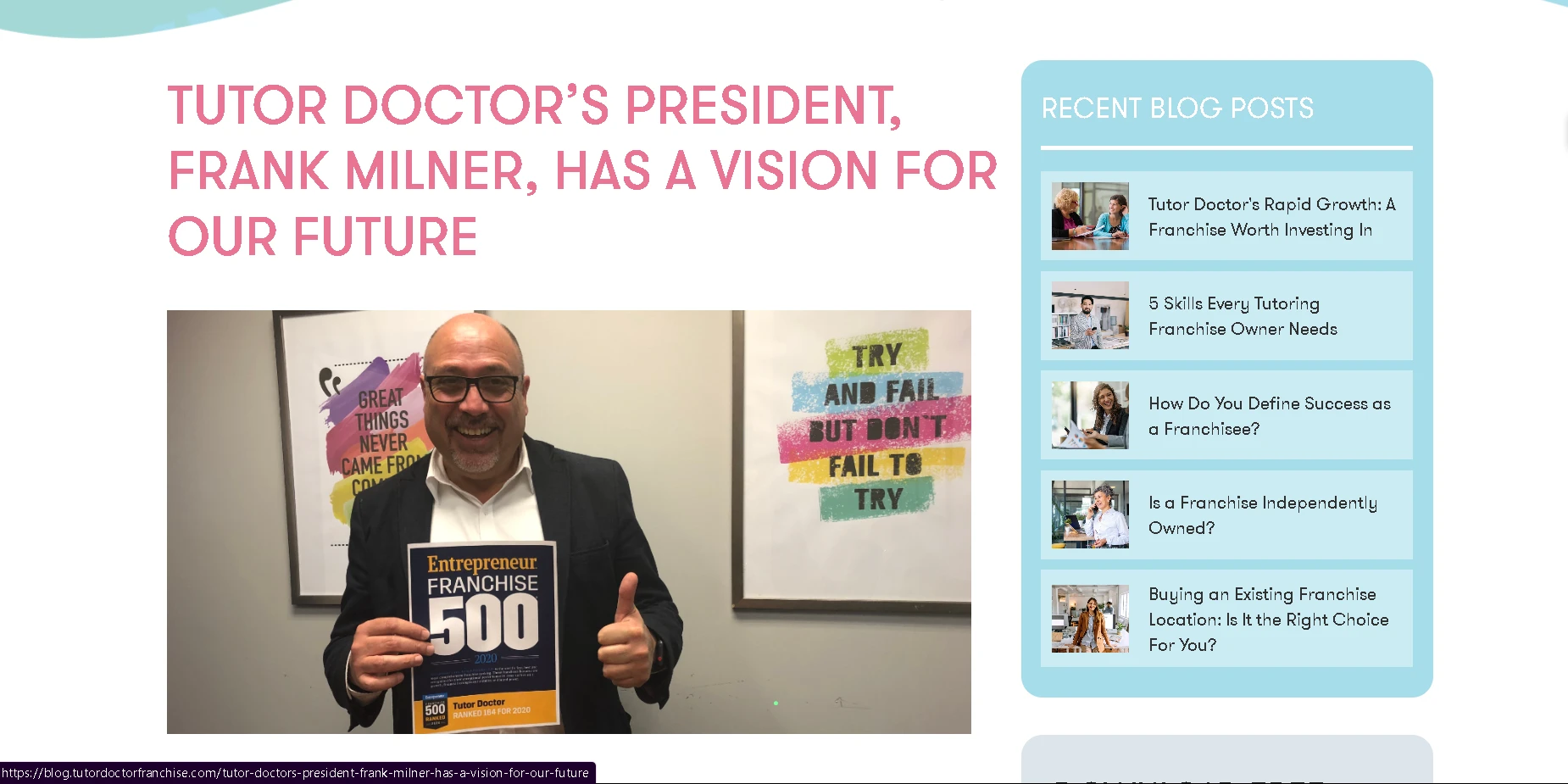
FAQs About Tutor Doctor
- Is Tutor Doctor accredited? Tutor Doctor is a franchise company and not “accredited” in the sense of a school. It is a member of tutoring associations, but BBB accreditation is local-based. For example, the Laguna Niguel branch has a B– BBB rating (not accredited). The franchise itself is widely recognized (Entrepreneur’s #1 tutoring franchise for many years).
- How do I sign up? To start, you contact Tutor Doctor (via phone or website) and schedule a free consultation. There is no obligation after the consultation until you decide to buy hours.
- What is the minimum commitment? Typically, each branch has a minimum package (often around 10–20 hours). There is no semester-long contract required by the company (since you prepay hours, you aren’t locked in monthly). However, most families buy multi-session packages, so the effective commitment is the package size.
- Can I cancel anytime? You can stop scheduling new sessions at any time. For refunds of unused hours, Tutor Doctor formally offers a 60-day refund guarantee, but this is subject to terms. In practice, cancellations should be discussed with your local office. Keep in mind any registration fees (usually not refunded) and cancellation notice requirements.
- What if the tutor isn’t a good fit? Tutor Doctor’s “Tutor Match Guarantee” says they will assign a new tutor if you’re unhappy with the original match. In reality, you should immediately inform your consultant; most offices are willing to switch tutors if given a chance. This flexibility is part of their core promise.
- What subjects are covered? All major academic subjects. Math, science, English, test prep (SAT/ACT, GRE, etc.), and many more. They cater to K-12 and college levels. Specialized subjects are available, but it depends on tutor availability in your area or online.
- Where are sessions held? Primarily in your home or at a public place (like a library) as agreed. Online tutoring is also an option, using Tutor Doctor’s platform, especially useful if you live far from a center.
- Is Tutor Doctor legit? Yes. It’s been in business 20+ years with many locations worldwide. It’s a credible company, not a scam. Just be aware of the costs and make sure their approach fits your needs.
Conclusion
Tutor Doctor offers a well-established, personalized tutoring service with local support. Its strengths are the tailored matching, wide subject coverage, and franchise experience. However, weaknesses include high prices, large prepaid packages, and occasional complaints about billing or communication. In 2025, Tutor Doctor is incorporating new tools like AI to stay innovative. Students and parents should weigh whether they value the premium personalized service or prefer more flexible or cheaper alternatives. Platforms like My Engineering Buddy can be a strong alternative for STEM subjects, offering transparent pricing and specialized expertise. Ultimately, choosing a tutoring service depends on what each family needs: guaranteed one-on-one home service (Tutor Doctor) or on-demand online support (alternative platforms).
Sources: Company websites and blogs; franchise news and reviews; customer review forums; and independent consumer reports.
******************************
This article provides general educational guidance only. It is NOT official exam policy, professional academic advice, or guaranteed results. Always verify information with your school, official exam boards (College Board, Cambridge, IB), or qualified professionals before making decisions. Read Full Policies & Disclaimer , Contact Us To Report An Error

